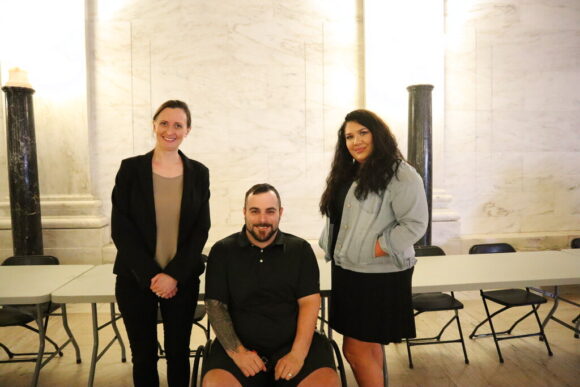Republicans in the West Virginia House passed a bill last week that would cap some of the damages workers and their families can receive if their employer deliberately puts them in harm’s way on the job.
The 52-45 vote was one of closest of the legislative session in the House, where Republicans control 88 of the 100 seats and have a supermajority. It came a day after the House observed a moment of silence to honor a 73-year-old coal miner who died Sunday while working in West Virginia’s southern coalfields.
Minority Whip Shawn Fluharty, an opponent of the bill, called its GOP supporters hypocrites.
“For the past decade, I’ve heard Republicans say, ‘There’s a war on coal, there’s a war on coal,'” the Democrat said. ”Couldn’t see a campaign mailer go out without saying that, and today Republicans are saying, ‘Miner’s life: $500, 000.”’
“I don’t want to see a tweet. I don’t want to see a campaign mailer. I don’t want to hear uttered in the hallways of this Capitol how much you love coal miners,” he said.
Most workers’ compensation laws protect employers from being sued by their employees as long as they provide them with benefits. Under West Virginia law, if an employer acts with “deliberate intent” to cause an injury to an employee, the employer loses that immunity.
Legislation has been introduced in recent years to eliminate or cap damages workers can receive from companies. The issue has been pushed by the timber and logging industry, which argues that the law puts an unsustainable burden on businesses.
The proposals have been opposed by the United Mine Workers of America and families and workers who have traveled to the Charleston to testify against them at the state Capitol.
Shelly Rosser sued a mining company under the state’s deliberate intent statute after her husband of 20 years died in a West Virginia coal mine in 2017. He died after he hit his head exiting a mine in the same spot where a miner was paralyzed in a 2013 accident, she said.
After the miner was injured in 2013, the company was ordered to place lights and reflective tape in the area. But Rosser said the company never did.
“I live in Logan County – the heart of coal country,” said Rosser, who said she was left to provide for four children on her own. ”To see coal on someone’s face is frightening to me now, and I see it every day.”
The bill advanced to the Senate would cap noneconomic damages at $500,000, or twice the economic damages – which could mean medical bills or other expenses related to the workplace incident – incurred by a worker and their
It was a new version of the bill described as a “compromise” by lawmakers in the House Judiciary Committee. The original proposal would have capped noneconomic damages to $250,000. It also would have eliminated a provision that allows workers to sue their employer if they can prove they developed pneumoconiosis, a lung disease developed due to inhalation of dust.
The bill the House passed would not eliminate a worker’s ability to file pneumoconiosis deliberate intent claims, but it would require that the employee prove that their employer fraudulently concealed or manipulated dust samples or air quality samples.
Lead sponsor Republican Del. John Paul Hott said the bill doesn’t reflect his “original desire” for the legislation.
“But I believe it to be a step in the right direction,” he said.
Republican Del. David Adkins, who opposes the bill, said he doesn’t usually speak on the House floor, but he wanted to address this issue.
“I think I was voted in not to come up here and put a cap on someone’s life,” he said. “That’s what I’ve got to say about the bill.”
Photo: From left, Caitlin O’Dell, Jonathan Barber and Shelly Rosser pose for a photo together at the West Virginia state Capitol in Charleston W.Va., Feb. 17, 2022, after testifying at a hearing against a bill that would eliminate workers and their families’ ability to receive financial relief beyond workers’ compensation in cases where an employer’s deliberate negligence led to injury or death. Republicans in the West Virginia House passed a bill Tuesday, Feb. 28, 2023, that would cap some of the damages workers and their families can receive if their employer deliberately puts them in harm’s way on the job. (AP Photo/Leah M. Willingham, File)
Topics Virginia
Was this article valuable?
Here are more articles you may enjoy.



 US Appeals Court Rejects Challenge to Trump’s Efforts to Ban DEI
US Appeals Court Rejects Challenge to Trump’s Efforts to Ban DEI  Florida’s Commercial Clearinghouse Bill Stirring Up Concerns for Brokers, Regulators
Florida’s Commercial Clearinghouse Bill Stirring Up Concerns for Brokers, Regulators  Florida Engineers: Winds Under 110 mph Simply Do Not Damage Concrete Tiles
Florida Engineers: Winds Under 110 mph Simply Do Not Damage Concrete Tiles  ‘Structural Shift’ Occurring in California Surplus Lines
‘Structural Shift’ Occurring in California Surplus Lines 

